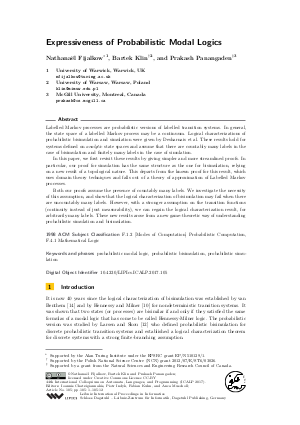Expressiveness of Probabilistic Modal Logics, Revisited
Authors Nathanaël Fijalkow, Bartek Klin, Prakash Panangaden
-
Part of:
Volume:
44th International Colloquium on Automata, Languages, and Programming (ICALP 2017)
Part of: Series: Leibniz International Proceedings in Informatics (LIPIcs)
Part of: Conference: International Colloquium on Automata, Languages, and Programming (ICALP) - License:
 Creative Commons Attribution 3.0 Unported license
Creative Commons Attribution 3.0 Unported license
- Publication Date: 2017-07-07
File

PDF
LIPIcs.ICALP.2017.105.pdf
- Filesize: 489 kB
- 12 pages
Document Identifiers
Subject Classification
Keywords
- probabilistic modal logic
- probabilistic bisimulation
- probabilistic simulation
Metrics
- Access Statistics
-
Total Accesses (updated on a weekly basis)
0Document
0Metadata
Abstract
Labelled Markov processes are probabilistic versions of labelled transition systems. In general, the state space of a labelled Markov process may be a continuum. Logical characterizations of probabilistic bisimulation and simulation were given by Desharnais et al. These results hold for systems defined on analytic state spaces and assume that there are countably many labels in the case of bisimulation and finitely many labels in the case of simulation. In this paper, we first revisit these results by giving simpler and more streamlined proofs. In particular, our proof for simulation has the same structure as the one for bisimulation, relying on a new result of a topological nature. This departs from the known proof for this result, which uses domain theory techniques and falls out of a theory of approximation of Labelled Markov processes. Both our proofs assume the presence of countably many labels. We investigate the necessity of this assumption, and show that the logical characterization of bisimulation may fail when there are uncountably many labels. However, with a stronger assumption on the transition functions (continuity instead of just measurability), we can regain the logical characterization result, for arbitrarily many labels. These new results arose from a new game-theoretic way of understanding probabilistic simulation and bisimulation.
Cite As Get BibTex
Nathanaël Fijalkow, Bartek Klin, and Prakash Panangaden. Expressiveness of Probabilistic Modal Logics, Revisited. In 44th International Colloquium on Automata, Languages, and Programming (ICALP 2017). Leibniz International Proceedings in Informatics (LIPIcs), Volume 80, pp. 105:1-105:12, Schloss Dagstuhl – Leibniz-Zentrum für Informatik (2017)
https://doi.org/10.4230/LIPIcs.ICALP.2017.105
BibTex
@InProceedings{fijalkow_et_al:LIPIcs.ICALP.2017.105,
author = {Fijalkow, Nathana\"{e}l and Klin, Bartek and Panangaden, Prakash},
title = {{Expressiveness of Probabilistic Modal Logics, Revisited}},
booktitle = {44th International Colloquium on Automata, Languages, and Programming (ICALP 2017)},
pages = {105:1--105:12},
series = {Leibniz International Proceedings in Informatics (LIPIcs)},
ISBN = {978-3-95977-041-5},
ISSN = {1868-8969},
year = {2017},
volume = {80},
editor = {Chatzigiannakis, Ioannis and Indyk, Piotr and Kuhn, Fabian and Muscholl, Anca},
publisher = {Schloss Dagstuhl -- Leibniz-Zentrum f{\"u}r Informatik},
address = {Dagstuhl, Germany},
URL = {https://drops.dagstuhl.de/entities/document/10.4230/LIPIcs.ICALP.2017.105},
URN = {urn:nbn:de:0030-drops-73683},
doi = {10.4230/LIPIcs.ICALP.2017.105},
annote = {Keywords: probabilistic modal logic, probabilistic bisimulation, probabilistic simulation}
}
Author Details
References
-
W. Arveson. An Invitation to C^*-Algebra. Springer-Verlag, 1976.

-
M. Bernardo and M. Miculan. Disjunctive probabilistic modal logic is enough for bisimilarity on reactive probabilistic systems. In ICTCS, volume 1720, pages 203-220, 2016.

-
P. Billingsley. Probability and Measure. Wiley-Interscience, 1995.

-
R. Blute, J. Desharnais, A. Edalat, and P. Panangaden. Bisimulation for labelled Markov processes. In LICS, 1997.

-
J. Desharnais. Labelled Markov Processes. PhD thesis, McGill University, 1999.

-
J. Desharnais, A. Edalat, and P. Panangaden. A logical characterization of bisimulation for labelled Markov processes. In LICS, pages 478-489, 1998.

-
J. Desharnais, A. Edalat, and P. Panangaden. Bisimulation for labeled Markov processes. Information and Computation, 179(2):163-193, 2002.

-
J. Desharnais, V. Gupta, R. Jagadeesan, and P. Panangaden. Approximating labeled Markov processes. Information and Computation, 184(1):160-200, 2003.

-
J. Desharnais, V. Gupta, R. Jagadeesan, and P. Panangaden. A metric for labelled Markov processes. Theoretical Computer Science, 318(3):323-354, June 2004.

-
M. Hennessy and R. Milner. On observing nondeterminism and concurrency. In ICALP, volume 85, pages 299-309, 1980.

-
A. S. Kechris. Classical Descriptive Set Theory, volume 156 of Graduate Texts in Mathematics. Springer-Verlag, 1995.

-
K. G. Larsen and A. Skou. Bisimulation through probablistic testing. Information and Computation, 94:1-28, 1991.

-
P. Panangaden. Labelled Markov Processes. Imperial College Press, 2009.

-
J. van Benthem. Modal correspondence theory. PhD thesis, University of Amsterdam, 1976.

